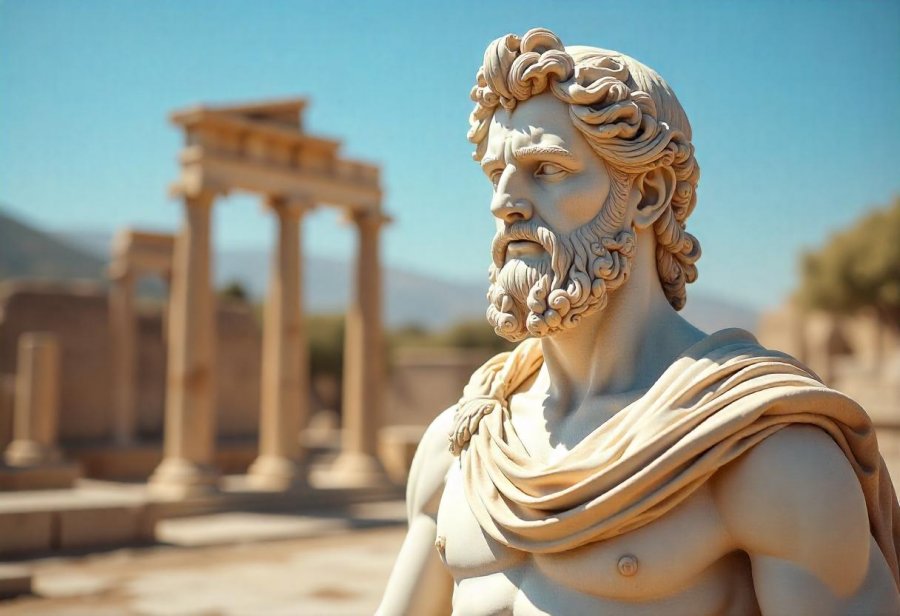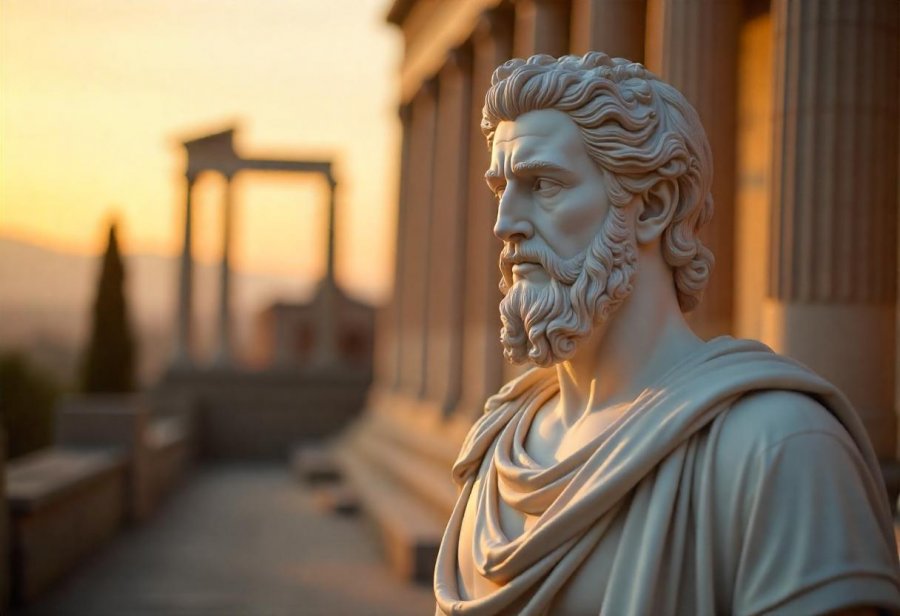Discover how Alexander the Great’s visionary leadership and innovative tactics transformed ancient warfare and empire-building. From his early education under Aristotle to his relentless campaigns across Persia and India, Alexander’s mastery of strategic flexibility, psychological warfare, and engineering ingenuity set him apart as a legendary conqueror. His ability to adapt to diverse terrains, employ deception, and inspire unwavering loyalty reveals timeless lessons for modern leadership. But what truly fueled his unstoppable drive was a grand vision of uniting cultures under a shared banner—a purpose that transcended mere conquest. Dive into the contrast between his creative problem-solving and personal charisma, and consider how these principles continue to resonate today. Can contemporary leaders harness such adaptability and cultural sensitivity to forge enduring legacies? Alexander’s story challenges us to view obstacles as opportunities, highlighting that strategic innovation and authentic connection are the keys to transformative success.

Alexander the Great: Visionary Leader and Strategic Genius
Alexander the Great emerges not merely as a name etched into the annals of history but as a figure whose life embodies the very essence of visionary leadership and strategic brilliance. Born in 356 BCE in Pella, the vibrant heart of Macedonia, he was immersed in a world that highly valued martial prowess, intellectual curiosity, and cultural exchange. From a young age, his education was shaped by Aristotle himself, whose teachings extended beyond philosophy to encompass politics, ethics, and the art of warfare. This blend of intellectual rigor and martial discipline laid a foundation that would define Alexander’s approach to conquest and governance, setting him apart from many of his contemporaries.
His rise to power was anything but straightforward. Following the assassination of his father, King Philip II, Alexander inherited a throne fraught with both peril and opportunity. The Macedonian kingdom was formidable but required consolidation, yet his ambitions stretched far beyond its borders. From the outset, he demonstrated an unwavering determination to expand his realm—driven not only by a desire to defend what he had inherited but by a vision of creating an empire that would leave a lasting mark on history. Early military campaigns, often fought alongside his father, served as invaluable training grounds that sharpened his tactical skills and leadership qualities. These formative experiences, combined with his innate confidence and charisma, prepared him to lead armies into uncharted territories.
What truly distinguishes Alexander is how he merged inherited strategic insight with a relentless personal drive for greatness rooted in a sense of destiny. His campaigns were fueled by more than territorial ambition; they reflected a broader vision of uniting diverse peoples and cultures under a common banner. Inspired by legendary heroes and mythic figures, Alexander believed himself destined to transcend the limits of ordinary achievement. This fusion of personal ambition and cultural aspiration created a leadership style that was both inspiring and relentless, propelling him across continents and into the realm of legend as one of history’s greatest conquerors.
His development into a leader was profoundly shaped by a combination of innate qualities and significant experiences. Charisma, confidence, and a sharp strategic mind were complemented by his education and exposure to a variety of cultures. Mentorship under Aristotle instilled in him a curiosity about the wider world and a deep appreciation for cultural exchange as a pillar of empire-building. Early military engagements, including campaigns fought alongside his father, not only honed his tactical acumen but also demonstrated his capacity to inspire loyalty. His personal involvement in these campaigns, sharing risks alongside his soldiers, fostered a bond of trust that would underpin his successes throughout his career.
At the core of Alexander’s enduring legend lies a unique blend of strategic ingenuity and personal charisma. His military campaigns showcased mastery over complex tactics—from sieges and river crossings to daring surprise attacks—each executed with precision and adaptability. His ability to outmaneuver larger or better-equipped enemies often hinged on his tactical flexibility and innovative thinking. But beyond the battlefield, his broader ambitions reveal a visionary leader who saw conquest not merely as territorial expansion but as a means to forge a connected, culturally enriched empire. Inspired by myth and driven by a conviction that he was shaping history itself, Alexander’s relentless pursuit of new horizons was motivated by a desire to create a legacy that would transcend his lifetime and influence future civilizations.
Mastering the Art of War: Core Strategies and Tactical Innovation
Alexander the Great’s military and leadership strategies exemplify a masterful balance of innovation, adaptability, and psychological insight that distinguished him from his peers. Central to his approach was the legendary phalanx formation—a dense infantry block armed with long pikes called sarissas. Far from a static line, this formation was a flexible tool that could be maneuvered swiftly across varied terrains, providing both offensive and defensive strength. Alexander understood that discipline and cohesion were vital, but rigid tactics could become liabilities; hence, he often combined the phalanx with more mobile units and unconventional tactics to maintain the element of surprise and responsiveness.
Surprise and deception formed the core of many of Alexander’s battlefield maneuvers. He excelled at manipulating perceptions—using feigned retreats to lure enemies into overextending, then striking suddenly with concentrated force. These tactics relied heavily on psychological warfare, sowing fear and uncertainty among opponents. His ability to create confusion and exploit enemy complacency often left enemies demoralized even before the first clash, transforming battles into psychological victories that set the stage for physical conquest.
Territorial awareness and terrain mastery further defined Alexander’s strategic genius. He was adept at turning natural features—mountain passes, rivers, urban environments—into advantages rather than obstacles. His campaigns often hinged on swift adaptation to the landscape, employing engineering ingenuity and timing to outflank and surprise opponents. The crossing of the Hydaspes River in India exemplifies this, where he employed innovative engineering and precise timing to outmaneuver a numerically superior Indian force. His siege tactics also reflected a sophisticated understanding of engineering, combining technical innovation with psychological pressure to undermine fortified cities, often leading to rapid victories that defied expectations.
Leadership for Alexander was as much about inspiring loyalty as it was about tactical excellence. He led from the front, sharing hardships and dangers with his troops, which fostered a deep trust and unwavering loyalty. This personal involvement wasn’t merely symbolic; it was a deliberate strategy to elevate morale and forge a collective identity centered on shared purpose. His charisma and confidence created an emotional bond that motivated his soldiers to push beyond their perceived limits, turning individual courage into a cohesive and relentless force. This approach proved essential in maintaining cohesion across vast and diverse territories, where the leader’s presence often dictated the pace and outcome of campaigns.
Alexander’s logistical and political strategies underscored his comprehensive approach to empire-building. He meticulously gathered intelligence on terrain, enemy dispositions, and local customs before launching each campaign. His supply lines were designed for rapid movement, employing innovative provisioning methods that minimized vulnerabilities and sustained his armies over long distances. Politically, he sought to integrate local elites into his administration, blending Macedonian authority with indigenous practices. This dual strategy of military precision and cultural diplomacy helped reduce resistance and foster loyalty among diverse populations, ensuring stability beyond mere military conquest. His capacity to adapt tactics on the fly, leverage engineering innovations, and build alliances speaks to a leader whose strategic agility was fundamental to his sustained success.
Finally, Alexander’s ability to combine technical ingenuity with psychological and strategic flexibility created a legacy that endures. His campaigns demonstrated that victory often hinges on the capacity to innovate in response to unforeseen challenges. By employing rapid movements, deception, and terrain exploitation, he turned potential disadvantages into opportunities. His leadership was rooted in a relentless pursuit of a grand vision—uniting cultures and creating a connected empire—where strategic adaptability and inspiring loyalty were inseparable. The sophistication of his tactics continues to resonate, offering timeless lessons for modern leaders who seek to navigate complex, unpredictable environments with resilience, ingenuity, and purpose.

Decoding Alexander’s Tactics: Insights, Ambitions, and Enduring Lessons
Alexander’s strategies and ambitions reveal a leader whose vision extended well beyond mere territorial conquest. His tactical innovations were not isolated acts of brilliance but part of a broader understanding of warfare as a psychological and environmental enterprise. Each maneuver—be it employing deception, rapid mobilization, or terrain exploitation—was carefully calibrated to destabilize opponents before the first blow was struck. This layered approach demonstrates a leader who perceived war as a holistic challenge, where understanding human psychology and terrain was just as vital as wielding weapons. His capacity to manipulate perceptions on the battlefield often transformed potentially indecisive engagements into decisive victories, leaving enemies disoriented and demoralized even before combat commenced.
At the core of Alexander’s enduring reputation lies a seamless blend of tactical brilliance and personal charisma. Unlike many commanders who relied solely on brute force or numerical superiority, he led by example—sharing dangers, enduring hardships, and inspiring unwavering loyalty. His presence on the front lines was not merely symbolic but a deliberate strategy to elevate morale and forge an unbreakable bond of trust with his troops. This personal involvement created a sense of shared purpose, turning soldiers into believers in his grand vision of a unified world. Such emotional and psychological influence proved as powerful as any weapon, illustrating that true leadership hinges on the leader’s ability to connect, motivate, and inspire.
Alexander’s ambitions were rooted in a nuanced understanding of empire as a cultural and political project, not simply territorial expansion. His campaigns aimed to forge a lasting legacy through cultural synthesis, diplomatic alliances, and the integration of diverse peoples. He sought to legitimize his authority by respecting local customs, establishing marriages, and incorporating indigenous traditions into his governance. This pragmatic approach reduced resistance and fostered loyalty among the populations he conquered. It’s worth noting that his strategy of cultural diplomacy was as much about consolidating power as it was about broadening influence, illustrating a leader who understood that enduring empire-building required more than military might; it demanded a nuanced engagement with the social fabric of his realms.
The evidence suggests that Alexander’s tactical flexibility was the keystone of his success. His campaigns unfolded across a variety of terrains—from the rugged mountain passes of Persia to the challenging river crossings in India—and he demonstrated an uncanny ability to adapt swiftly. Whether employing engineering innovations to outflank Indian armies or modifying his formations to suit mountainous terrain, Alexander’s capacity to think on his feet kept his campaigns moving forward. This adaptability allowed him to turn obstacles into opportunities, often outmaneuvering larger or better-prepared enemies. It’s clear that his success was rooted in a mindset that prioritized responsiveness over rigidity, a trait that kept his armies resilient and his campaigns perpetually dynamic.
His logistical planning and political acumen further set him apart. Alexander meticulously gathered intelligence on terrain, enemy dispositions, and local customs before launching each campaign. His supply lines were carefully designed to support rapid movement over vast distances, often employing innovative provisioning methods that minimized vulnerabilities. Politically, he sought to incorporate local elites into his administration, blending Macedonian authority with indigenous governance models. This dual approach fostered stability and loyalty, reducing resistance and enabling smoother transitions of power. The integration of military precision with cultural diplomacy exemplifies a leader who viewed conquest as a comprehensive enterprise, where success depended on both strategic planning and adaptive governance.
The engineering feats and technological innovations embedded in Alexander’s campaigns underscore a leader deeply attuned to the power of invention and practicality. His engineers developed advanced siege engines, crossing techniques, and engineering solutions tailored to specific challenges. These innovations often provided a decisive edge, allowing him to breach fortified cities or surprise opponents in difficult terrain. Modern organizations can draw inspiration from this by fostering a culture that values creative problem-solving and technological integration. Just as Alexander harnessed engineering ingenuity to gain strategic advantages, contemporary leaders can leverage technological advances to enhance agility, efficiency, and competitive edge, recognizing that innovation often transforms the landscape of possibilities.
Speed and surprise remained fundamental principles guiding Alexander’s military operations. His campaigns prioritized rapid movement, often crossing treacherous terrain at a swift pace to strike unexpectedly. This relentless tempo kept enemies off balance, denying them the opportunity to mount coordinated resistance. In today’s fast-evolving environments, whether in business or military strategy, the ability to seize fleeting opportunities and respond quickly to unforeseen developments is equally critical. Leaders who cultivate a sense of urgency, streamline decision-making, and embrace flexibility position themselves to act decisively when moments of chance arise. Alexander’s mastery of speed and surprise reminds us that in a complex world, timing and adaptability often determine the outcome.
Finally, the overarching purpose that fueled Alexander’s relentless pursuit of greatness offers a timeless lesson. His vision of uniting diverse cultures under a shared banner motivated his armies and cultivated loyalty that transcended individual battles. This shared sense of destiny created cohesion that endured through hardships and extended far beyond his lifetime. Modern leaders can learn from this by articulating a compelling purpose—one that resonates emotionally and morally with their teams. When people believe they are part of something larger than themselves—be it transforming an organization, advancing a cause, or shaping society—they are more willing to endure hardships and persist in the face of adversity. Alexander’s life exemplifies that strategic flexibility, cultural sensitivity, and a purpose-driven mindset are essential ingredients for enduring leadership and lasting legacy.
This emphasis on innovation and adaptation extends beyond military strategy into modern organizational thinking as well. Leaders today can draw valuable lessons from Alexander’s ability to integrate technological advancements and creative problem-solving, fostering a culture that values continuous improvement. For those interested in exploring how these principles can be applied today, more insights can be found in this comprehensive guide on leadership in modern organizations.
Applying Alexander’s Wisdom: Modern Strategies for Leadership and Change
Modern leaders and strategists can draw profound lessons from Alexander the Great’s approach to conquest and leadership, especially his emphasis on adaptability. In today’s rapidly changing environment—whether in military operations, corporate strategy, or political negotiations—the capacity to remain flexible often makes the difference between success and failure. Alexander’s mastery lay in his ability to assess new circumstances swiftly and pivot his tactics accordingly. During his campaign in India, for instance, he faced unfamiliar terrain and formidable opponents. Rather than rigidly adhering to a preconceived plan, he employed innovative engineering techniques, altered his formations, and reconsidered siege strategies in real time. Contemporary leaders can emulate this mindset by fostering organizational agility, encouraging teams to think adaptively rather than sticking dogmatically to initial plans. This responsiveness turns unforeseen challenges into opportunities, allowing organizations to stay resilient and ahead of the curve.
Surprise and psychological warfare stand out as core elements of Alexander’s strategic arsenal. His ability to manipulate perceptions on the battlefield—using feigned retreats, sudden assaults, and deceptive maneuvers—created confusion and demoralization among his enemies. This psychological edge often proved more decisive than force alone. Today, whether in competitive markets or diplomatic negotiations, understanding the power of perception can be equally transformative. Leaders who craft surprise elements—such as innovative product launches, disruptive marketing tactics, or unexpected alliances—can destabilize competitors and influence stakeholder perceptions just as Alexander did in warfare. Recognizing the importance of timing, emotional impact, and the element of surprise allows leaders to shift the momentum in their favor without necessarily relying on brute force or resources alone.
Inspiration through personal involvement was a hallmark of Alexander’s leadership style. He was known for leading from the front, sharing hardships, and demonstrating resilience in the face of adversity. This active presence fostered a deep sense of trust and loyalty among his followers, transforming his soldiers into believers in his vision. Modern leaders can learn from this by demonstrating resilience and commitment during challenging times. When leaders show they are willing to face risks and difficulties alongside their teams, they cultivate a culture of loyalty and collective effort. Such leadership not only boosts morale but also encourages a shared sense of purpose that can carry organizations or units through crises, turning collective effort into a powerful force that surpasses individual capabilities.
Cultural sensitivity and political pragmatism played crucial roles in Alexander’s empire-building. He understood that military victory alone would not guarantee long-term stability. Instead, he incorporated local customs, established marriages, and respected indigenous traditions to legitimize his authority. This approach fostered loyalty and reduced resistance among diverse populations, laying a foundation for sustainable governance. Modern leaders can draw inspiration from this by emphasizing cultural intelligence—listening, respecting, and integrating local practices into their strategies. Building alliances based on mutual understanding and shared values often proves more effective than imposing top-down solutions. Such sensitivity not only smooths the path for immediate objectives but also creates enduring bonds that facilitate stability and cooperation over the long term.
Finally, meticulous planning and logistical foresight were integral to Alexander’s success. He conducted detailed reconnaissance of terrains, enemy dispositions, and local customs before launching each campaign. His supply lines were designed for rapid, sustained movement over vast distances, often employing innovative provisioning methods to minimize vulnerabilities. This thorough preparation allowed him to maintain momentum and respond swiftly to unforeseen developments. Modern leaders can adopt similar practices by prioritizing intelligence gathering, data analysis, and contingency planning. Understanding the environment, anticipating obstacles, and preparing flexible response strategies create resilience. Such strategic foresight ensures that organizations can navigate complex, unpredictable situations with agility, turning potential disruptions into avenues for advantage.
In essence, Alexander’s strategies reveal that adaptability, psychological insight, cultural intelligence, and meticulous planning are timeless principles of effective leadership. By embracing these lessons, modern leaders can craft strategies that are not only resilient but also inspiring—capable of transforming challenges into opportunities and forging lasting legacies. His example underscores that success in complex, dynamic environments depends less on rigid adherence to plans and more on the ability to think creatively, connect empathetically, and act decisively when it matters most. As the world continues to evolve, the enduring value of these principles remains clear: leadership rooted in flexibility, understanding, and purpose can shape history just as profoundly as military innovation did in Alexander’s time.

Reflections on Greatness: Lessons from Alexander’s Legacy and Future Inspiration
Alexander the Great’s legacy persists because it exemplifies how visionary leadership combined with strategic innovation can reshape history in profound and lasting ways. His capacity to adapt tactics across diverse terrains and cultures, paired with his charismatic leadership, offers a blueprint that continues to inspire modern notions of influence and empire-building. His campaigns demonstrated that true greatness often arises from the ability to innovate, motivate, and pursue a compelling purpose with unwavering resolve. Beyond the conquest itself, Alexander sought to forge a connected world—one rooted in cultural exchange and shared ideals—an ambition that remains relevant in today’s interconnected society.
What sets Alexander apart is his relentless pursuit of adaptability. The way he responded to unfamiliar environments, seized opportunities in moments of chaos, and employed engineering ingenuity highlights a mind attuned to change. His mastery of psychological warfare—using deception, surprise, and terrain exploitation—transformed potential disadvantages into advantages, often turning the tide of battles before they even began. These lessons underscore that in any complex challenge, flexibility and creative problem-solving are often more decisive than brute strength or rigid plans. His example encourages leaders to view obstacles as opportunities for ingenuity rather than insurmountable barriers.
Equally vital was his ability to inspire loyalty through personal involvement. Leading from the front, sharing hardships, and demonstrating resilience created a bond of trust with his followers that transcended mere military discipline. This emotional connection amplified his influence, transforming soldiers into believers in his grand vision. Modern leaders can draw from this by embodying resilience and commitment during crises, showing their teams that they are willing to face risks alongside them. Such authenticity fosters loyalty and motivates collective effort, turning shared purpose into a formidable force capable of overcoming even the most daunting adversities.
Cultural sensitivity and political pragmatism underpinned Alexander’s empire-building. He recognized that military victory alone would not secure long-term stability; instead, he incorporated local customs, established marriages, and respected indigenous traditions. This approach reduced resistance and fostered loyalty among diverse populations, laying the groundwork for sustainable governance. Leaders today can learn from this by emphasizing cultural intelligence—listening, respecting, and integrating local practices—and by building alliances based on shared values. Such strategies tend to create deeper bonds than force alone, ensuring that influence endures beyond military might and fostering a more resilient and cohesive society.
Meticulous planning and logistical foresight were central to Alexander’s sustained success. His detailed reconnaissance of terrain, enemy dispositions, and local customs allowed him to adapt swiftly and maintain momentum. Innovative provisioning methods and well-designed supply lines supported rapid, long-distance campaigns, demonstrating a level of strategic discipline that kept his armies resilient across vast and varied landscapes. Modern organizations can emulate this by investing in intelligence gathering, contingency planning, and adaptive logistics. The capacity to anticipate challenges and respond proactively turns potential setbacks into opportunities for growth and achievement, much like Alexander’s own campaigns.
Engineering breakthroughs and technological ingenuity played a crucial role in his victories. From sophisticated siege engines to innovative crossing techniques, Alexander’s engineers continually pushed the boundaries of military technology. These innovations often provided decisive advantages, enabling him to breach formidable defenses and surprise opponents in difficult terrain. Today’s leaders and strategists can draw inspiration from this emphasis on fostering a culture of innovation. Encouraging creative problem-solving and leveraging technological advances can lead to breakthroughs that redefine competitive landscapes, just as engineering did in Alexander’s time. His legacy reminds us that embracing innovation is vital to maintaining strategic superiority.
Finally, the overarching purpose that fueled Alexander’s relentless drive reveals the power of a compelling, shared vision. His pursuit of uniting diverse cultures under a common banner motivated his armies and fostered loyalty that extended beyond individual battles. This collective sense of destiny created cohesion that endured through hardship and left a lasting imprint on history. Modern leaders who articulate a clear, inspiring purpose can similarly energize their teams, fostering perseverance and dedication in pursuit of transformative goals. When people believe they are part of something larger than themselves, their capacity to sustain effort and overcome obstacles multiplies exponentially. Alexander’s life underscores that strategic flexibility, cultural sensitivity, and a compelling vision are essential ingredients for leadership that leaves a profound and enduring legacy.






